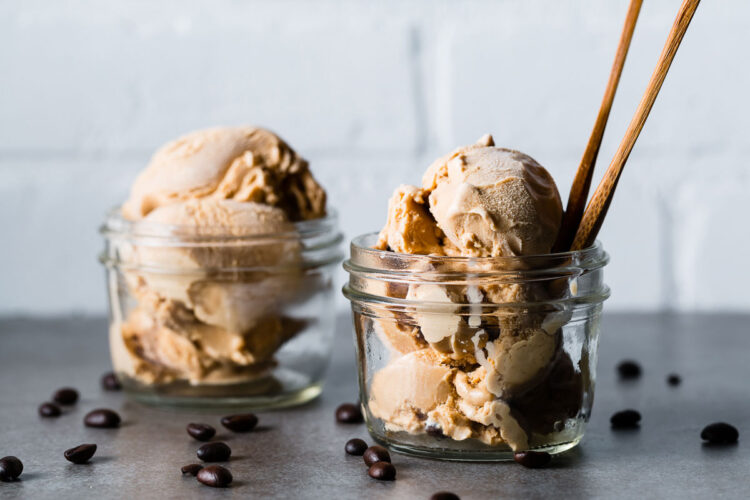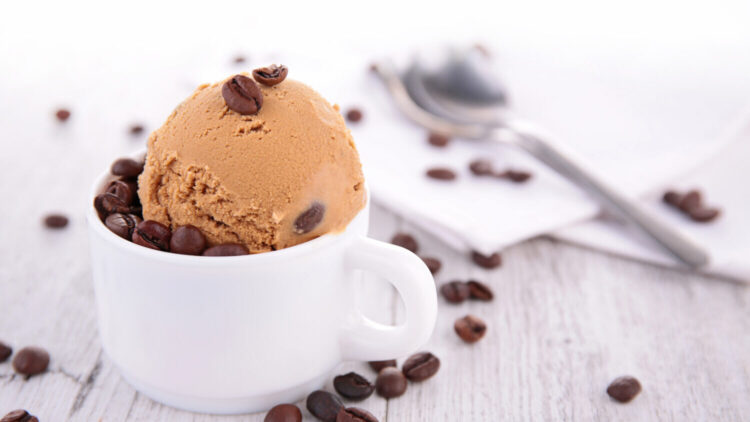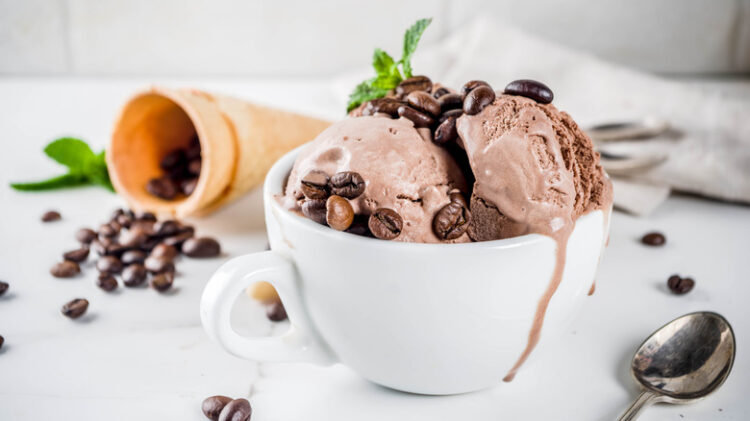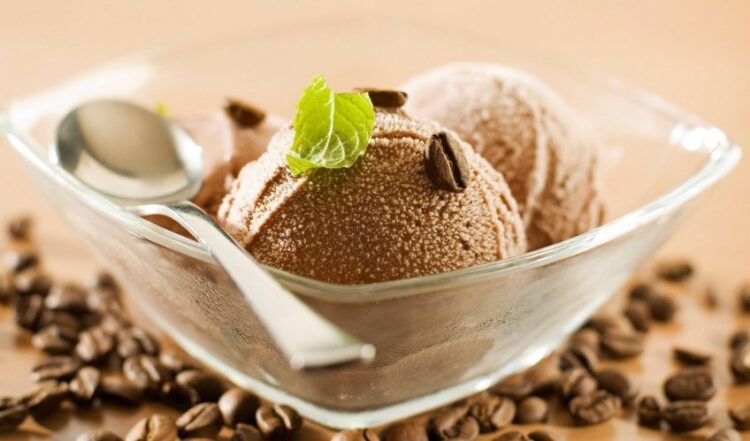It’s the peak of summer, you’re at the beach, eating your favorite ice cream and everything is just perfect…
As a passionate coffee lover myself, I know that the flavor you picked is coffee ice cream because it tastes unmistakably like your morning brew. The question that might often come to your mind is whether this treat has the same effect as the drink itself. Does it really contain caffeine?
So, fellow coffee enthusiasts, let’s uncover the truth!
Coffee Ice Cream: Does It Contain Caffeine?

Source: saltpepperskillet.com
Let’s tackle the burning question straight away: Yes, it usually contains a small amount of caffeine, but the exact amount can vary depending on the brand and recipe.
While the beverage is known for its caffeine content, the process of making ice cream involves diluting the coffee and combining it with other ingredients like cream and sugar. This dilution and mixing process can reduce its concentration in the final product.
The caffeine content in this dessert is generally much lower than that of a typical cup of the drink. The average serving of the ice cream usually contains around 1-5 milligrams of caffeine, while a cup of coffee can contain anywhere from 95 to 200 milligrams or more.
How is it Flavored?
The ice cream is flavored using a variety of methods to capture the distinct and beloved taste of coffee. The flavoring process involves infusing the ice cream base with the essence of coffee, creating perfect balance between the smooth, creamy texture of ice cream and the rich, aromatic notes of coffee.
One common method of flavoring this treat is by steeping ground coffee beans or grounds in the milk or cream used to make the base. This allows the natural flavors and oils to infuse into the liquid, creating a strong coffee essence that permeates throughout the ice cream.
Another technique involves using brewed coffee or espresso to enhance the flavor. By incorporating freshly brewed coffee into the ice cream mixture, the distinctive taste and aroma of it are transferred to the frozen dessert. This method provides a more pronounced flavor, as the brewed beverage is already concentrated and carries the characteristic notes of the specific coffee used.
In some cases, coffee extract or flavorings may also be used to achieve a consistent and robust flavor profile. These extracts or flavorings capture the essence of coffee and can be added to the base during the production process to ensure a well-balanced and authentic taste.
Impact of Caffeine

Source: simplemost.com
Given the trace amounts of caffeine in the ice cream, its impact is likely negligible for most people. The small amount of caffeine in it may provide a slight, subtle boost for some individuals, but it is unlikely to have a significant impact on energy levels or cause the same effects as a caffeinated beverage.
It’s important to note that individual sensitivity to caffeine can vary, and those who are particularly sensitive or looking to avoid it altogether may opt for decaffeinated alternatives. Overall, it is generally mild and unlikely to produce strong or noticeable effects.
Decaffeinated Coffee Ice Cream
This alternative offers a delightful option for those who wish to enjoy the flavors and essence of coffee without the stimulating effects of caffeine any time of the day or evening. This frozen treat is made using a decaffeinated beverage, where most of the caffeine has been removed through a specialized process.
If you’re unsure about its content in your ice cream, check the ingredient list on the packaging. Brands using real coffee or extracts will list these ingredients, suggesting some caffeine content.
FAQs:

Source: tastingtable.com
Is there a noticeable taste difference between regular coffee ice cream and decaffeinated one?
The taste difference is minimal, as decaffeinated coffee ice cream still captures the essence and flavors.
Does the amount of caffeine in it decrease over time, affecting its potency?
The caffeine content remains relatively stable over time if stored properly, so its potency is not significantly affected.
Are there any non-dairy or vegan options available for coffee-flavored ice cream without caffeine?

Source: simplemost.com
Yes, there are non-dairy and vegan alternatives for this dessert available that are also caffeine-free. For example Coconut Milk Coffee Ice Cream, Almond Milk Mocha Ice Cream or Oat Milk Caramel Macchiato Ice Cream.
Are there any health benefits associated with the consumption of caffeine in this ice cream?
It may provide a slight boost in energy levels, but the concentration is generally too low to offer significant health benefits.
Is it possible to remove caffeine from the ice cream at home?
It is challenging to remove caffeine at home, as specialized processes are typically used by manufacturers.
To sum up…
In conclusion, coffee ice cream does contain caffeine, but the amount is typically quite low and unlikely to have a significant impact on most individuals. The exact amount can vary based on the brand, recipe, and how the ice cream is flavored, whether that be by steeping coffee grounds in the cream, using brewed coffee, or incorporating extracts or flavorings.
That being said, individual sensitivity to caffeine can differ greatly, and even small amounts can affect certain individuals. For those who are particularly sensitive to it or looking to avoid it completely, a decaffeinated alternative is an excellent option that allows you to enjoy the rich coffee flavor without the caffeine.
Ultimately, the key to enjoying this delightful treat while managing its caffeine content lies in understanding the product and its ingredients. Always check the packaging and ingredient list if you’re unsure. Remember, the goal is to delight in your dessert while keeping it in line with your dietary needs and preferences.






